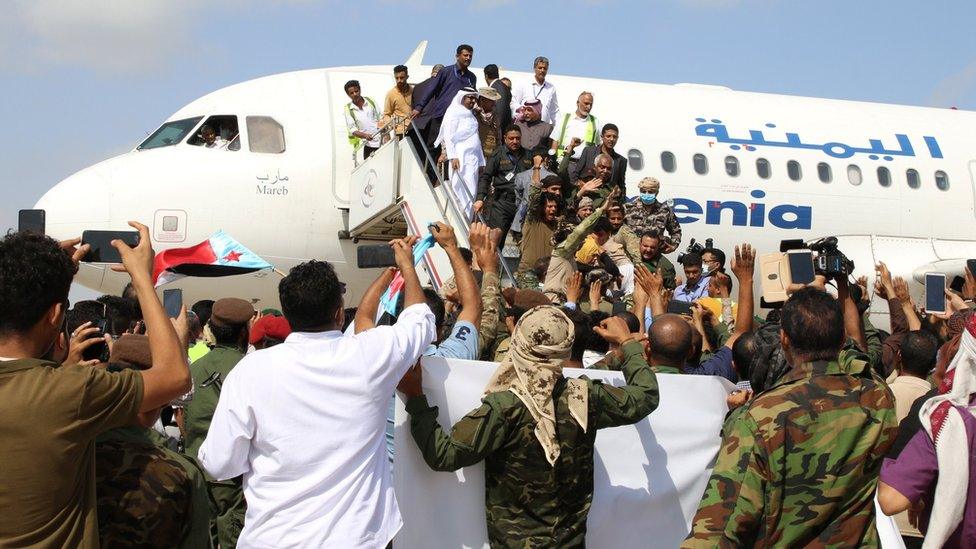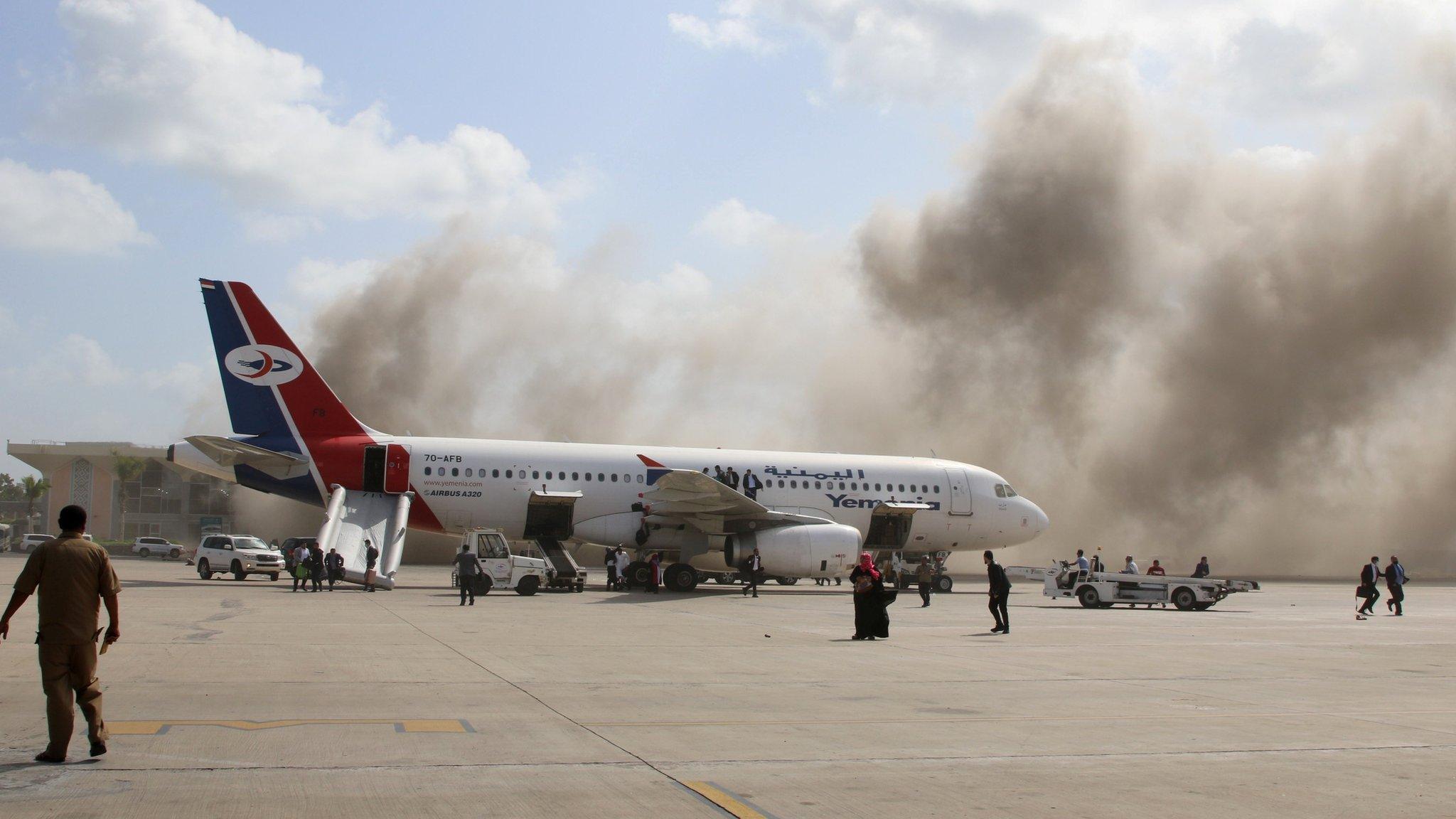Yemen war: Deadly attack at Aden airport as new government arrives
- Published
Video shows the moment the Aden airport is attacked (30 December 2020 report)
At least 22 people have been killed and more than 50 wounded in an attack at the airport in the southern Yemeni city of Aden, officials say.
There was at least one explosion shortly after a plane carrying the war-torn country's newly formed government arrived from neighbouring Saudi Arabia.
Aid workers and officials were among the casualties. But the prime minister said he and his cabinet were "fine".
The information minister accused Houthi rebels of a "cowardly terrorist act".
Allow X content?
This article contains content provided by X. We ask for your permission before anything is loaded, as they may be using cookies and other technologies. You may want to read X’s cookie policy, external and privacy policy, external before accepting. To view this content choose ‘accept and continue’.

Yemen has been devastated by a conflict that escalated in 2015, when a Saudi-led coalition of Arab states launched a military operation to defeat the Houthis and restore President Abdrabbuh Mansour Hadi's rule.
The fighting has reportedly left more than 110,000 people dead; triggered the world's worst humanitarian disaster, with millions on the brink of famine; and left the country even more vulnerable to the Covid-19 pandemic.
(November 2020) Three Yemeni teens share how their lives have changed
Video footage of Wednesday's incident showed that there was a large blast as passengers began leaving the plane that had flown the new cabinet to Aden.
A crowd that had gathered on the tarmac to welcome the ministers fled as thick smoke billowed from the airport terminal. The sound of gunfire was heard soon afterwards.
An AFP news agency correspondent reported hearing at least two blasts in total, as did Minister for International Co-operation Najeeb al-Awj.
The cause was not clear, but a security source told Reuters news agency that three mortar shells landed on the terminal.
Saudi television channel Al-Hadath meanwhile broadcast a video that it said showed a missile hitting the tarmac and exploding, external.
In August 2019, 36 people were killed in a Houthi missile attack on a military parade in Aden.

A crowd was gathered on the tarmac beside the plane to welcome the new cabinet
The International Committee of the Red Cross (ICRC) said three members of staff were killed in Wednesday's attack, and three others were injured, including one seriously.
Their staff were transiting through the airport with other civilians, the organisation said in a statement.
Dominik Stillhart, ICRC's director of operations, said: "The Yemeni people have endured a terrible amount of suffering over the last five years. A day like this adds even more grief both for the Red Cross family and for the Yemeni families who had loved ones killed or injured in this explosion."
Yemeni news website Al-Masdar Online reported that an undersecretary at the labour ministry, Yasmin al-Awadhi, was killed and that Deputy Minister of Youth and Sport Moneer al-Wajeeh and Deputy Transport Minister Nasser Sharif were among the injured.

Smoke and dust billowed from the terminal, close to the plane carrying cabinet ministers
Prime Minister Maeen Abdulmalik Saeed and his cabinet were taken to safety following the attack.
Mr Saeed tweeted, external: "We and the members of the government are in the temporary capital of Aden and everyone is fine.
"The cowardly terrorist act that targeted Aden airport is part of the war that is being waged against the Yemeni state and its great people," he added.
"It only increases our determination to carry out our duties."
UN special envoy Martin Griffiths strongly condemned the attack.
"I wish the cabinet strength in facing the difficult tasks ahead," he said in a statement, external. "This unacceptable act of violence is a tragic reminder of the importance of bringing Yemen urgently back on the path towards peace."
Later on Wednesday there was another explosion near the Maashiq presidential palace where the prime minister took refuge. Saudi-funded Al Arabiya TV reported that an explosive drone was shot down.


Yemen's newly formed "unity cabinet" was always going to have a rocky start. But it clearly did not anticipate this disaster when it announced its arrival would be livestreamed on television.
The red carpet was rolled out to send a signal to long-suffering residents in the south that a new government was on its way to address their many complaints, including the infighting between the government and the Southern Transitional Council (STC) that has blighted their lives and weakened the fight against Houthis in the north
In a video message, the prime minister declared they would not be scared away.
The president and many ministers have been leading comfortable lives in the Saudi capital, Riyadh. This audacious attack, which they blame on the Houthis, underlines the risks of coming back, and the risks of staying away. It is also a blunt message to their Saudi and Emirati allies, trying to extricate themselves from this punishing fight, that it is still far from over.

Mr Saeed's new cabinet was formed in an effort to heal a long-running rift between Saudi-backed government forces and militias loyal to the separatist Southern Transitional Council, supported by the United Arab Emirates.
The two sides are supposed to be allies in the civil war against the Houthi movement, which controls the capital Sanaa and much of north-western Yemen.
But in the past two years a power struggle has triggered several rounds of fierce infighting.
In August 2019, the STC seized control of Aden and refused to allow the cabinet to return to its temporary home until Saudi Arabia brokered a power-sharing deal that November.
The agreement was never implemented and there were fresh clashes this April, when the STC declared self-rule in southern Yemen.
The separatists rescinded their declaration three months later and agreed to revive the power-sharing deal after receiving a commitment that there would be equal representation for northerners and southerners in the 24-member cabinet. The two sides also agreed on the separation of forces inside Aden.

You may want to watch:
In the capital, Sanaa, the BBC found Covid-19 had spread but most were still in the dark about the virus (15 December 2020 report)